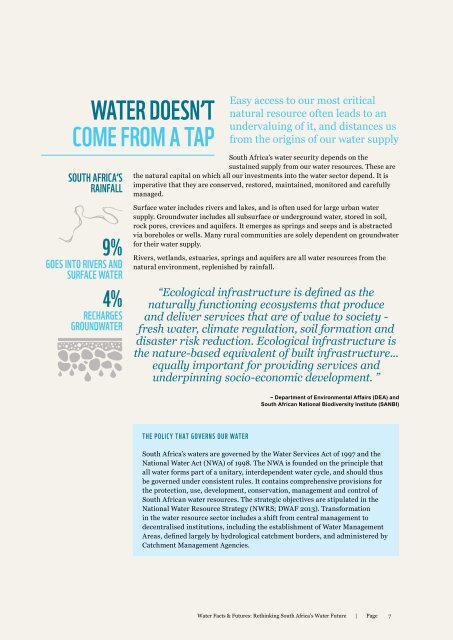55UXOuRjI
55UXOuRjI
55UXOuRjI
Create successful ePaper yourself
Turn your PDF publications into a flip-book with our unique Google optimized e-Paper software.
WATER DOESN’T<br />
COME FROM A TAP<br />
SOUTH AFRICA’S<br />
RAINFALL<br />
Easy access to our most critical<br />
natural resource often leads to an<br />
undervaluing of it, and distances us<br />
from the origins of our water supply<br />
South Africa’s water security depends on the<br />
sustained supply from our water resources. These are<br />
the natural capital on which all our investments into the water sector depend. It is<br />
imperative that they are conserved, restored, maintained, monitored and carefully<br />
managed.<br />
9%<br />
GOES INTO RIVERS AND<br />
SURFACE WATER<br />
4%<br />
RECHARGES<br />
GROUNDWATER<br />
Surface water includes rivers and lakes, and is often used for large urban water<br />
supply. Groundwater includes all subsurface or underground water, stored in soil,<br />
rock pores, crevices and aquifers. It emerges as springs and seeps and is abstracted<br />
via boreholes or wells. Many rural communities are solely dependent on groundwater<br />
for their water supply.<br />
Rivers, wetlands, estuaries, springs and aquifers are all water resources from the<br />
natural environment, replenished by rainfall.<br />
“Ecological infrastructure is defined as the<br />
naturally functioning ecosystems that produce<br />
and deliver services that are of value to society -<br />
fresh water, climate regulation, soil formation and<br />
disaster risk reduction. Ecological infrastructure is<br />
the nature-based equivalent of built infrastructure...<br />
equally important for providing services and<br />
underpinning socio-economic development. ”<br />
− Department of Environmental Affairs (DEA) and<br />
South African National Biodiversity Institute (SANBI)<br />
THE POLICY THAT GOVERNS OUR WATER<br />
South Africa’s waters are governed by the Water Services Act of 1997 and the<br />
National Water Act (NWA) of 1998. The NWA is founded on the principle that<br />
all water forms part of a unitary, interdependent water cycle, and should thus<br />
be governed under consistent rules. It contains comprehensive provisions for<br />
the protection, use, development, conservation, management and control of<br />
South African water resources. The strategic objectives are stipulated in the<br />
National Water Resource Strategy (NWRS; DWAF 2013). Transformation<br />
in the water resource sector includes a shift from central management to<br />
decentralised institutions, including the establishment of Water Management<br />
Areas, defined largely by hydrological catchment borders, and administered by<br />
Catchment Management Agencies.<br />
Water Facts & Futures: Rethinking South Africa’s Water Future | Page<br />
7


